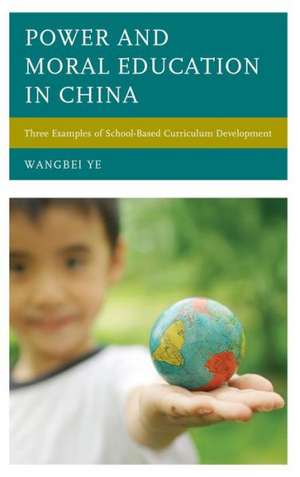Power and Moral Education in China: Emerging Perspectives on Education in China
Autor Wangbei Yeen Limba Engleză Hardback – 15 apr 2014
Preț: 699.17 lei
Preț vechi: 908.02 lei
-23% Nou
Puncte Express: 1049
Preț estimativ în valută:
133.78€ • 139.68$ • 110.72£
133.78€ • 139.68$ • 110.72£
Carte tipărită la comandă
Livrare economică 04-18 aprilie
Preluare comenzi: 021 569.72.76
Specificații
ISBN-13: 9780739175477
ISBN-10: 0739175475
Pagini: 192
Ilustrații: 7 black & white halftones, 11 tables
Dimensiuni: 155 x 231 x 20 mm
Greutate: 0.41 kg
Ediția:New.
Editura: Rowman & Littlefield
Seria Emerging Perspectives on Education in China
ISBN-10: 0739175475
Pagini: 192
Ilustrații: 7 black & white halftones, 11 tables
Dimensiuni: 155 x 231 x 20 mm
Greutate: 0.41 kg
Ediția:New.
Editura: Rowman & Littlefield
Seria Emerging Perspectives on Education in China
Notă biografică
Wangbei Ye is lecturer of the Moral-political Education section in the Department of Political Science at East China Normal University.
Cuprins
Chapter 1: Introduction
Chapter 2: Power and Curriculum: Western Perspectives
Chapter 3: Power and Curriculum in China: The Case of School-based Moral Education
Chapter 4: Example 1: State-led Power Decentralization
Chapter 5: Example 2: School-led Power Sharing
Chapter 6: Example 3: Market-led Power Redistribution
Chapter 7: Towards an Understanding of Power as Semi-emancipatory Relation: Comparison and Discussion
Descriere
In Power and Moral Education in China, Wangbei Ye examines China's recent initiation of school-based curriculum development in moral education as a means to analyze the power redistribution brought about by China's economic reform. Though there is a great deal of scholarship dealing with moral education in China, the role of power has never been systematically discussed in relation to this topic.













